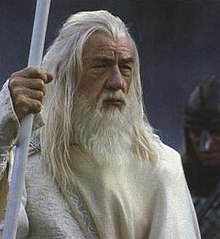
My congregation knows that I will use an illustration from the Lord of the Rings whenever one comes to me, its either a gift to them or a curse, depending upon one's view of Tolkien's masterpiece. That being said, while I was re-reading the LOTR for the 15th+ time this past week, I was struck by the wisdom of a conversation between the wizard Gandalf (who is actually an immortal Maiar named Olorin {nerd alert!}, akin to an angel), and the leaders of the resistance to Sauron (also a Maiar, i.e. a fallen angel or demon). Gandalf tells Aragorn, the next king of Gondor, Eomer, the next king of Rohan, Prince Imrahil, and the sons of Elrond that, "it is not our part to master all the tides of the world, but to do what is in us for the succour of those years wherein we are set, uprooting the evil in the fields that we know, so that those who live after may have clean earth to till. What weather they shall have is not ours to rule."
What, then, is the relevance of the advice of a fictional wizard given to fellow fictional characters regarding a fictional moral and existential threat? As it turns out, a great deal. J.R.R. Tolkien's mythology, while embracing at times a Norse attitude of fatalism influenced by a belief in Ragnarok (seen in the ride of the Rohirrim to battle to aid Gondor, despite the near-certainty of defeat), remained fundamentally an ethos that reflected his own Christian worldview. Tolkien believed in God as Creator, in God as Savior, and in God as the ultimate judge of humanity. He believed that our actions, and our attitudes, matter. He believed in the reality of Right and Wrong. And so, when faced with a seemingly insurmountable evil, the advice of Gandalf, a voice that could double as that of Tolkien himself, is to do our best with what is in front of us.
It has become common in politics, and more frighteningly, for some within the Church, to look at global problems, national problems, or even localized problems, as being too big to solve. If the problem cannot be 100% fixed with any particular attempted solution, then the effort is dismissed and nothing is done. In other words, if the whole problem can't be solved in one fell swoop, don't bother trying. This myopic pessimism is both morally reprehensible and extremely dangerous. If 1,000 children were starving in the midst of a famine, and you only had food enough to save 10, how would you explain to Almighty God that you decided to do nothing, not even save those you had the power to save, because you couldn't do everything? To do nothing is an act of moral cowardice, to do nothing is a violation of what has been entrusted to us by God.
What moral evil is starring you right in the face? What problem is in your very neighborhood, as an individual, a church, or a community, that you could impact with the resources you already have? Do something, try, make an effort in the battle between Good and Evil.
Consider the words of the 18th century philosopher Edmund Burke, "The only thing necessary for the triumph of evil is for good men to do nothing." We must act, we must strive, for evil does not sleep.
With more authority, a few examples of the call to action from Scripture:
Matthew 25:14-46, the parable of the Talents (in which the one who is condemned buries his responsibility in the ground and does nothing) as well as the famous line, "I tell you the truth, whatever you did for one of the least of these brothers of mind, you did for me."
Ephesians 6:10-13, Finally, be strong in the Lord and in his mighty power. 11 Put on the full armor of God, so that you can take your stand against the devil’s schemes. 12 For our struggle is not against flesh and blood, but against the rulers, against the authorities, against the powers of this dark world and against the spiritual forces of evil in the heavenly realms. 13 Therefore put on the full armor of God, so that when the day of evil comes, you may be able to stand your ground, and after you have done everything, to stand.
Hebrews 12:1-3, Therefore, since we are surrounded by such a great cloud of witnesses, let us throw off everything that hinders and the sin that so easily entangles. And let us run with perseverance the race marked out for us, 2 fixing our eyes on Jesus, the pioneer and perfecter of faith. For the joy set before him he endured the cross, scorning its shame, and sat down at the right hand of the throne of God. 3 Consider him who endured such opposition from sinners, so that you will not grow weary and lose heart.
James 2:17-18, 17 In the same way, faith by itself, if it is not accompanied by action, is dead.
18 But someone will say, “You have faith; I have deeds.” Show me your faith without deeds, and I will show you my faith by my deeds.
Steven Spielberg uses this same notion as the capstone of Schindler's List, a variation of a quote from the Talmud (Sanhedrin 4:5) spoken by Ben Kingsley's character, Itzhak Stern: "Whoever saves one life, saves the world entire."
